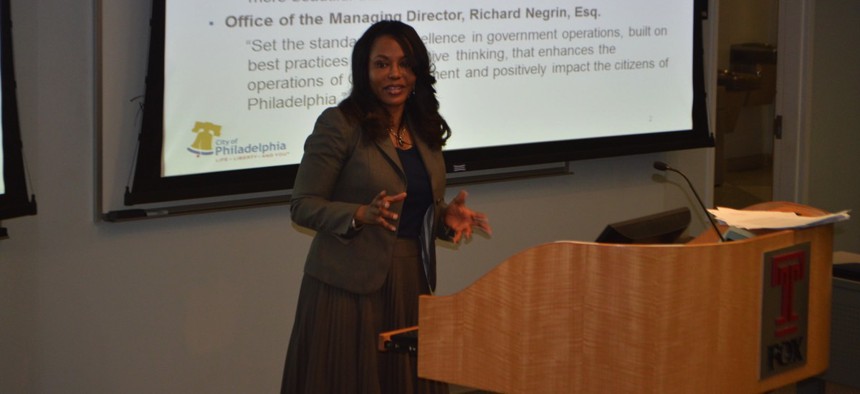Transforming Philadelphia’s City Services Through Customer Service

Rosetta Lue teaching a social media class in March 2014 at Temple University. Philadelphia Managing Director's Office / Flickr.com
Rosetta Lue, the city’s chief customer service officer, says “there is a change that’s happening across government from local up to the federal level where we’re all trying to improve that experience.”
What if citizens were called “customers” of their local government?
That’s how Rosetta Lue, the executive director of the City of Philadelphia’s 311 Contact Center and the city’s chief customer service officer, describes them. The program is a service for residents, where they can contact their city via avenues like calling or using a smartphone app, and is trying to assist people with getting in touch with government.
Lue talked to Route Fifty about the public and private sectors and also how the program has changed throughout the years. To her—someone whose career was previously spent working in the private sector, where she was an employee for USAA and American Express —she thinks government once had more of a monopoly mindset.
“We took the customer for granted,” Lue said of government. “It was just like, ‘Well . . . where else are you going to get your permits or where else are you going to find that information?’ What I’ve seen, there is a change that’s happening across government from local up to the federal level where we’re all trying to improve that experience.”
With the 311 program in Philadelphia, Lue says the city has made changes to accommodate what their customers—different groups from businesses to visitors to residents themselves, she explains—want. One example was how the program took its data to better routes at which the city was fixing streetlights.
“They were able to save money by just rerouting the way that they were dispatching their workers,” she said, “ . . . that’s where data really helps.”
Another example of how the program has ultimately evolved is the program’s app. It is now usable in more than a dozen different languages. The mobile app itself was also a response to the issue that some residents had smartphones but not at-home Internet, Lue said.
“We were able to go OK, how do we communicate better to those folks and then we started a strategy of implementing our mobile app,” she said. The observation was based off what they heard from residents.
Via the app, someone can snap a picture of a problem and send a message in for the city to see, she said. The first app was launched around three years ago.
When the city found out that many people didn’t primarily speak English at home as a first language, they made it “translatable” into 17 languages, she said.
Although one might think, given the population’s addiction to smartphones, that the mobile app would be the most highly used, the 311 program is still most popular through calls. Lue says the program receives 1.2 million to 1.5 million calls annually. The app, on the other hand, was downloaded more than 20,000 times.
The city also has a program for adults looking to serve as leaders in the area, where they get to use the system just like people working for the program do, she said. They’ve since adopted a youth program, where kids can become a part of it.
The kids program itself has also changed—instead of the youth being talked at, like with training for adults, kids get to experience it. With the app, it was explained to them and then actually showed the kids how to utilize it, Lue said.
“They went in their neighborhoods and they were out there and we did the tour . . . typically we don’t do that with the adults . . . but for the kids it’s like hands-on learning,” she said.
Lue started working for the city back in 2008, where she came on board to work for the 311 program. She sees a difference between how government and private companies operate.
“There’s a profit involved in the things that you’re doing . . . if you don’t make any profit, the doors are closed, so being successful is very important to the private sector,” she said.
The public sector can go slower, and the private sector is more financially-focused, she says.
“In the public sector it’s a little bit more about the thought process, getting things done right,” she said.
Lue also said that, thanks to companies like Amazon and Uber, government is evolving in what people expect to get from it.
“You have all these different companies that are moving quickly and folks like that type of service,” she said. “They know what they’re getting, and they’re expecting that from their government as well.”
Government has to evolve, she said.
“The way you did traditional services and customer service in the past for the public sector, that’s morphing into making it better and faster and easier for the customers to deal with you,” she said.
(Photo by Philadelphia Managing Director's Office / Flickr.com )
Allison Prang is a journalist based in Charleston, S.C., where she writes for the Post and Courier covering technology and tourism. She has also written for The Wall Street Journal, Bloomberg News, The Kansas City Star and others.
NEXT STORY: When a Police Department Urges Local Residents to Stay Off Their Phones





